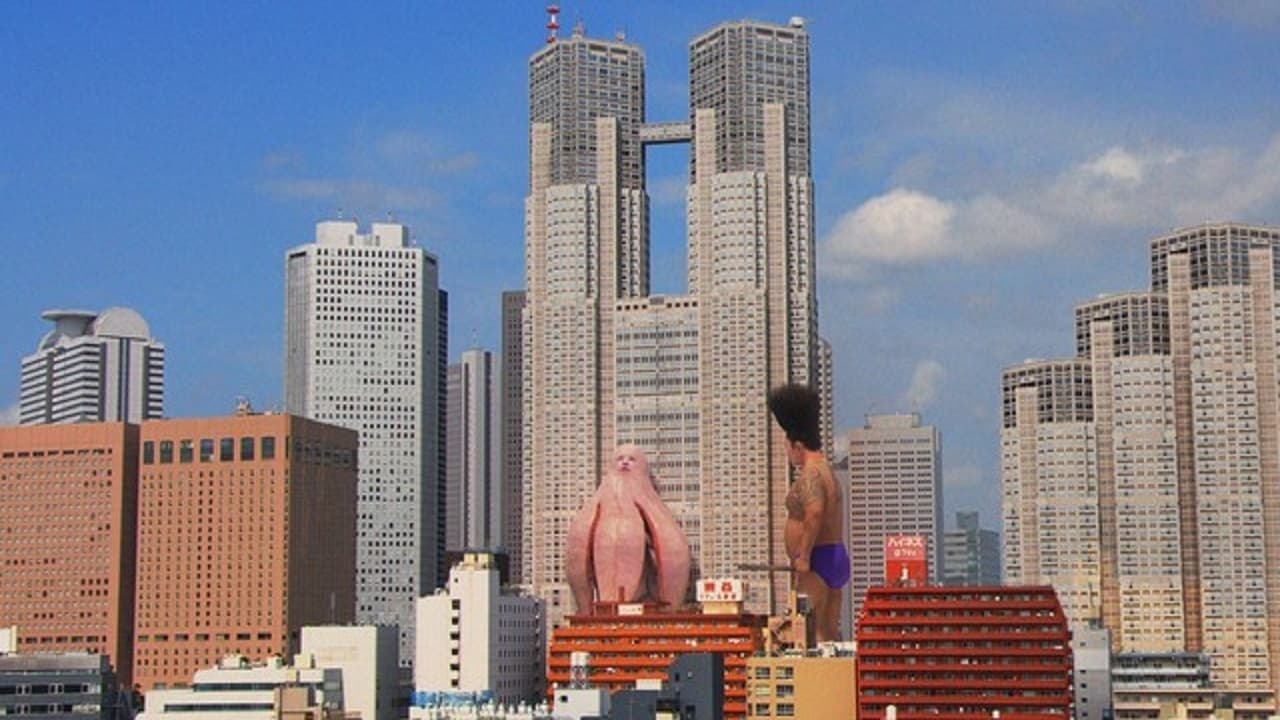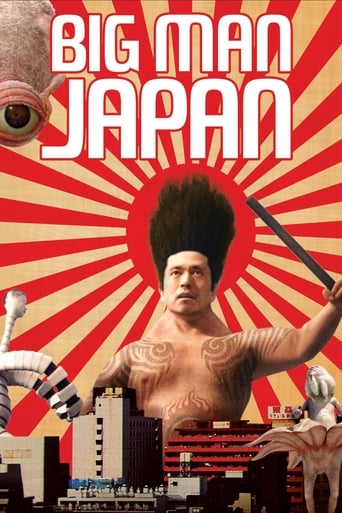Inclubabu
Plot so thin, it passes unnoticed.
TrueHello
Fun premise, good actors, bad writing. This film seemed to have potential at the beginning but it quickly devolves into a trite action film. Ultimately it's very boring.
Livestonth
I am only giving this movie a 1 for the great cast, though I can't imagine what any of them were thinking. This movie was horrible
ConsistentlyFalconer
This is a film that deals with so many issues that we encounter every day. Family, for example - the pain of our hero Masaru Daisato as he tries to re-connect with his estranged wife and child.Tradition, and what your elders expect of you.The culture of celebrity - especially unwanted celebrity - and the way that public figures are often expected to jump through one set of hoops, then back through another set as the will of the general public changes. Big Man Japan stars its writer and director Hitoshi Matsumoto, but this is not a self- indulgent vanity project. It's an excellent film that deserves your attention.(By the way, the plot revolves around a man who turns into a 100-foot giant, and whom the Japanese government deploys to defend the country against attacks from monsters. Also includes the most insane ending to any film I've ever seen - including Sleepaway Camp.)yetanotherfilmreviewblog.tumblr.com
CountZero313
Hitoshi Matsumoto is one of a rare breed of comedians with a special gift. Tommy Cooper had it, Billy Connelly has it sometimes - the ability to make you laugh the moment they appear on stage. I've followed Matsumoto and Downtown since 1989, when I first encountered them on the sketch comedy show Yume de Aetara. A lot of his experimental comedy on the small screen since then has been outrageous, cerebral and/or scatological. It is almost always riotous, and for that reason I was expecting more of the same here. Part of Matsumoto's genius is in how he reigns in his basic instincts, creating a tension for domestic audiences, while also fashioning a clever narrative with universal appeal. That tension makes for a glorious release when classic Matsumoto moments do appear, such as standing in front of giant purple underpants, or the edit to his pixel-ated daughter in a bunny hat declaiming her indifference to her father, in contrast to the sentimental speech on her he has just given.Many Japanese geinojin seem fettered by the jimusho system that controls their creative output, and you feel sympathy for the truly talented ones who seem capable of so much more than the usual prime-time foolishness (Takuya Kimura, take note). I always had a sneaking suspicion Downtown's Hamada-san could rise to a serious dramatic role if given the chance, so it is a pleasant surprise to be blind-sided by Matsumoto here. Understated, even moving in places, with a wonderfully comic climactic scene where the 'traditional' Matsumoto surfaces, Big Man Japan is a refreshing addition to Matsumoto's array of comic talent. Small mention to Ua as the mercenary manager, a cold-blooded portrayal. Was Matsumoto having a sly dig at his Jimusho's creative accounting? Matsumoto bites the hand that feeds here, but then feeds them in turn with the grosses this film has earned. The man is practically re-inventing the term irony, in art and in his life. Genius.
tullebi
A funny movie. Makes ya think. Like the sequences of kid interviews, totally realistic about talking to kids at high school and community college, you know, "I'ma bad an don't like nuffin' bout popular opinion. Hey, come over to ma crib and we get high, watch some TV." Big Man seems all about popular opinion in Japan media. Back when, there was big popular opinion and big monsters to fight. Now there's salarymen and looking hip. Subtle cultural references too, or not so subtle. Mob monster does shake downs, stink monster is breeding with the young, like, "Let's get in the cars and make smog, man! I been doing this for decades." Ooh, is the red scary thing N. Korea, or just the usual big meanies? Takes US media to organize opinion around that. But US has the same problems going, the young want something new, and "Baby Or Die!" just ain't cutting it. Let's try, "I Love My Beam!" Like, everybody wants peace these days. Mother Super America is perfect at the end, what with being eight stone overweight. And I love Father Super America's RED NIPPLES!!! Are they really in the shape of stars? Also, a final touch too good to be subtle, the last portion of movie, in the thick foam padding and clumsy choreographing to show US media prowess, "Watch it in real time." A movie not for prime time but for watching in a complicated world.
MidnightTrash
Hitoshi Matsumoto's wonderfully deadpan "Big Man Japan" ("Dai-Nihonjin) is a brilliantly hilarious send up of Japan's giant monster movies of yesteryear. A postmodernist at heart, Matsumoto flips the genre conventions, grounding the beautifully weird world of "Big Man Japan" in reality through a dry mocumentary style that mixes interviews, archival footage and computer animated fight scenes with a razor's wit.Masaru Daisato is the latest in a long legacy of men who grow to mammoth proportions when juiced with electricity. Masaru spends most of his time as a normal-sized human being, surviving on a meager government stipend in a grimy suburb of Tokyo. But when strange monsters attack (and believe me they are strange), Masaru is hooked up to a power plant and juiced with enough electricity to grow into a purple underweared giant.Not that any of this endears Masaru to the citizens of Japan. The road to the power plant is plastered with signs critical of Masaru's actions and abilities. His house is covered in threatening graffiti and vandalized on a daily basis. Masaru is an outsider in a country of insiders, a colorful anachronism in increasingly bland times.Perspective is a central theme in "Big Man Japan"'s giant monster weirdness. Does having the ability to turn into a giant and save the country from destructive building-stomping monsters make you a hero or a freak? It all depends on who you ask.There's no doubt that Masaru is a loser. When not attacking giant monsters with a large pipe, Masaru sits in his graffiti-covered home eating dehydrated seaweed ("It only grows big when you need it.") while neighbors throw bricks through his windows. Masaru's wife and daughter have left him, photos are all that remains of his profession's illustrious past and his show routinely earns less ratings than the weather report. No one ever said it was easy being big.And perhaps this is the biggest joke in Matsumoto's wonderfully awkward film. Godzilla eventually became a friend of the children, saving Japan from countless invading monsters, but he was always a foreigner. Godzilla called Monster Island home, not the gray slums of Tokyo. Ultraman was from outer space not Osaka. This is an important difference. Forced to live among the very people he fights to protect, Masaru became the biggest oddity in a hegemonic society based on Confucian values.The world of "Big Man Japan" is one of dashed hopes and squandered potential, a world where Masaru's senile grandfather, made so by repeated exposure to high levels of electricity, zaps himself giant and wanders through the city. And the monsters, as outrageously weird as they may be, never actually seem threatening in any way.Instead, the creatures, with their comb-overs, phallic eyes and sexual perversions seem as oblivious as children that their actions do any harm. Masaru dispatches the beasts by clubbing them once in the head, not through a long drawn out fight, and their souls ascend to heaven in a campy 8-bit video game fashion.And by the end, when Matsumoto drops the mocumentary cameras and the computer animation for a ridiculous symbolism-heavy homage to cheesy rubber suits and miniature sets fare like "Ultraman" it hardly makes sense but is hilarious nonetheless. I would've preferred "Big Man Japan" didn't end with an allegory about Japan-China relations and the reliance on the American military for protection filtered through campy 1970s kaiju sensibilities but what the hell, it was one crazy ride.Taken from http://www.midnighttrash.net/?p=677 MidnightTrash.net: Your guide to everything under the radar.

